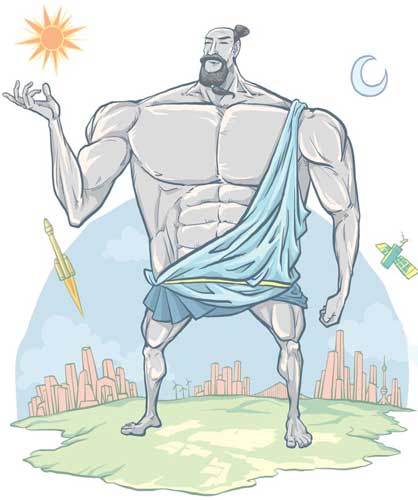No, no, no. That's the way forward
Updated: 2011-06-24 10:53
By Le Yucheng (China Daily European Weekly)
Scientific Outlook on Development to define China's growth in the coming decades
 |
As a diplomat I travel widely. Wherever and whenever I go, either to participate in bilateral talks or to attend multilateral conferences and seminars, questions people raise most are about the rise of China. What does China think while rising? How will China act after rising? What does China's rise mean to the outside world? Is it possible for China to rise peacefully?
All these questions are tough to answer. However, I got enlightened from the famous historian Niall Ferguson's book Civilization, which used "seven killer applications" to describe Western advantages. So I simplify my answers to those questions as the Three No's, that is, No easy way to take, No existing model to emulate, No strategic intention to challenge.
No easy way to take
Anne-Marie Slaughter, my former US counterpart in the US State Department, told me, she had never known of any other nation in human history like China, which is not only one of the richest, but also among the poorest of the world. In my point of view, China and the US have totally different kinds of "exceptional-ism". Here are some facts and figures, which may help people perceive the "exceptional-ism" of China.
Five-thousand-year uninterrupted civilization (one of the world's oldest civilizations)
1.3 billion population (roughly four times the number of people in the US, three times the number of people in the EU)
9.6 million square kilometers of territory (which is the third largest in the world, third only to Russia and Canada)
The second largest world economy
More than 10 percent of annual GDP growth in the past 30 years
200-300 million middle-class people
150 million people living below the poverty line (by the United Nations standard of $1 a day)
10 million people having no access to electricity
24 million people in need of employment each year (which is bigger than the population of Canada)
80 million disabled people (which is nearly as many as the German population)
There is really no easy way for China to take the road to prosperity. Great changes have taken place over the past 60 years, especially the last 30 years.
Lawrence Summers, former economic adviser to US President Barack Obama, repeatedly points out that by the conservative growth estimation of 7 percent per year, China's GDP is doubling every decade and people's living standards are being raised by 50 percent every 10 years.
Behind these facts and figures are the supreme sacrifice and extraordinary hard work of the Chinese people.
In comparison with those rising powers in history whose emphasis was on military strength, conquering lands or seeking dominant positions in the world, China has acted graciously.
Looking back over the 60-year history since the founding of the People's Republic of China, there have been no civil wars, no invasion or aggression of our outside borders. No refugee problems, no conflicts or financial crisis triggered by China. We try to absorb and solve our own challenging problems, including by-products of modernization, urbanization and industrialization within our borders, instead of troubling others.
All achievements China has made are earned by the wisdom and creativity of Chinese people, as well as fair competition and mutual benefit.
As opposed to looting, plundering or invasion, China has been on a road of peaceful development. It fully shows that China's development is part of global development, and the better China develops, the greater the contribution it will make to the world.
No existing model to emulate
I read an editorial in Newsweek recently, which said that China is abandoning its opening-up policy and shifting away from the West, but I don't think so. China is always a modest nation. We never reject learning from others.
There are two interesting figures. One is that 400 million Chinese have been lifted out of poverty over the past 30 years. The other is that 400 million Chinese have learned English over the past 30 years.
At first sight, it seems that the two figures are not associated with each other. But I believe there are close links between the two. Without the latter, i.e. without learning cutting-edge technology, advanced culture and experiences from the West, we could not have solved our poverty problems, at least not so fast. China cannot make such progress without learning from the outside world, certainly including the West.
However, learning from others is one thing, copying other's models is another. China has been learning development experiences and lessons from the US and European countries for a long time, and combining them with Chinese reality.
China, as I said, is a unique country. We cannot blindly emulate models of others. Models which are functionally effective in European countries, may not work in China.
Over the past decades, we have been trying to explore our own way of development, and fortunately we have succeeded in many ways. The return of Hong Kong and Macao to the motherland has enriched the concept of "one country, two systems" in both theory and practice. We succeeded in solving the employment problem in the countryside on the basis of establishing township enterprises. We succeeded in solving banking problems at the beginning of this century, so we survived the international financial crisis of 2008.
Deng Xiaoping encouraged us to always explore our own way by saying that, "cross the river while feeling the rocks." But not every rock felt is hard or stable enough for river crossing. That's why we have had lots of experiments in many fields. We also move forward to constantly update our concept of development in order to keep pace with changing times.
For example, another of Deng Xiaoping's saying is, "it does not matter what color a cat is, as long as it catches mice". Now we come to find that the color of the cat does matter, as we increasingly prefer a "green cat". That's why during the 17th Party Congress, General Secretary Hu Jintao put forward a slogan of Scientific Outlook on Development. We can say that's the new rock we have found.
The Scientific Outlook on Development is very important for China's development in the coming decades.
No strategic intention to challenge
We have no strategic intention to challenge the current international system. Some people suggest that a rising China will overturn the existing world order and build a new one to better meet its own interests. I want to say China is not the former Soviet Union. China has no intention to build military alliances, to fight for greater spheres of influence, or to overthrow the present international system.
We know that the current international system is built on the basis of lessons and experiences of two world wars. It reflects, to some extent, the reality of the world and the balance of power. It has played a very important role in maintaining the peace and security of our world. China has also benefited a lot from this order. So why should we try to break it?
China is increasingly integrated in the international system. In 2001, China joined the World Trade Organization. Now China is an important member of the International Monetary Fund (IMF) and the World Bank. As a member of the international system we are members of over 100 global organizations and signed nearly 300 international treaties.
China has played more and more important roles in the activities of the United Nations, the G20, the World Bank, the IMF and other international organizations, and has proven that it is willing and able to work within, rather than outside of this system.
John Ikenberry, a professor at Princeton University, believes that the chances of a conflict between China and the existing order are not in the offing. China will rise, and the order will live long, he says.
Ikenberry assumes that the international order today is fundamentally different than that faced by rising nations in the past. In his words, the present order is hard to break but easy to join. I think he is right. The international community should accommodate China's peaceful development rather than fear it, help rather than hinder it and support rather than constrain its effort.
We can clearly see from the 2008 financial crisis that the current international system is not entirely functional. The international system should be reformed and improved to keep pace with the changing times, so as to be fairer and more rational.
A top economist from the IMF believes that the size of the GDP of developing countries will outstrip the developed countries in the near future. It is reasonable that developing countries want to have a bigger voice in the IMF or World Bank. Many people have asked why the head of the IMF has always been selected from Europe and believed it is time to change this practice, though not this time I think. However, this point reflects the reality of the world and deserves serious consideration.
The author is director-general of the Policy Planning Department at the Ministry of Foreign Affairs.
E-paper

Shining through
Chinese fireworks overcome cloudy times, pin hopes on burgeoning domestic demand
Pen mightier than the sword
Stroke of luck
Romance by the sea
Specials

90th anniversary of the CPC
The Party has been leading the country and people to prosperity.

My China story
Foreign readers are invited to share your China stories.

Green makeover
Cleanup of Xi'an wasteland pays off for ancient city
